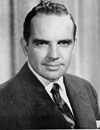Tennessee
Gov. Andrew Johnson
-
October 17, 1853 - November 3, 1857
March 12, 1862 - March 4, 1865 - Democratic
- December 29, 1808
- July 31, 1875
- North Carolina
- Married Eliza McCardle; five children
- Resigned
- Representative, Senator, Vice President, President
About
Born in Raleigh, North Carolina, ANDREW JOHNSON never attended school and was eventually taught to read and write by James J. Selby, a tailor, for whom Johnson apprenticed. He moved to Greeneville, Tennessee with his mother and stepfather at the age of seventeen. His political career began just three years later, when he was elected Greeneville Alderman, following which he served as the city’s Mayor for four years. He went on to win election to both the Tennessee House of Representatives and Senate, after which he became a member of the U.S. House of Representatives for ten years. When Whig gerrymandering threatened his congressional seat, he waged a successful campaign for governor. During his firm gubernatorial term, Johnson supported public education, overseeing enactment of the first state law that levied a tax for financing public schools. He defeated the Know-Nothing candidate for a second term, during which legislation was enacted providing for the sale of bonds for railroads and regulating banking practices. In 1856 Johnson supported the Democratic ticket, helping James Buchanan to carry Tennessee-the first time that the state had voted the national Democratic ticket since Andrew Jackson’s presidency. A grateful Democratic State Legislature endorsed him for a third term as governor and selected him for a U.S. Senate seat before the term ended. He served in the Senate from 1857 to 1862, when President Abraham Lincoln awarded him the rank of Brigadier-General and appointed him Military Governor of Tennessee. As the leading Tennessean opposed to secession from the Union, Johnson-despite being a Democrat—was selected by the Republicans’ National Union Party as its vice-presidential candidate in order to help win Lincoln’s reelection, and when Lincoln was assassinated only a few weeks into his new term, Johnson became the nation’s seventeenth President. However, Johnson’s moderate policies with respect to Reconstruction rankled Radical Republicans who succeeded in overriding the new President’s veto of their proposals. When southern rejection of the Fourteenth Amendment spurred a Radical Republican sweep of the mid-term elections to Congress, the Radical Republican agenda included the re-imposition of military rule on the south and of restrictions on the President. Johnson’s dismissal of Secretary of War Edwin Stinson was deemed to have violated these restrictions and articles of impeachment were brought against him for high crimes and misdemeanors. He was acquitted in the Senate by one vote, however, and served the remainder of his term. Although he won a Senate seat in 1875, he died of a stroke shortly after being elected. He was buried in Greeneville, where his home, tailor shop, and final resting place were designated the Andrew Johnson National Monument.
Source
Biographical Directory of the U.S. Congress
The National Cyclopaedia of American Biography, Vol. 2. New York: James T. White & Company.
Philips, Margaret I. The Governors of Tennessee. Gretna, LA: Pelican Publishing Company, 2001.
Sobel, Robert, and John Raimo, eds. Biographical Directory of the Governors of the United States, 1789-1978, Vol. 4. Westport, CT: Meckler Books, 1978. 4 vols.
White, Robert H. Messages of the Governors of Tennessee, 1845-1857. Nashville: The Tennessee Historical Commission, Vol. 4, 1952.
White, Robert H. Messages of the Governors of Tennessee, 1857-1869. Nashville: The Tennessee Historical Commission, Vol. 5, 1952.











